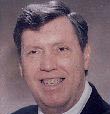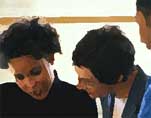Interview with Len SharpPresidential Award for Secondary Science Teaching, 1995 |
 |
During nearly 40 years of teaching, Len Sharp has traveled and studied on all seven continents through a variety of grants and brought back a wealth of knowledge to share with his students, teachers, and school’s community. During that time he assumed leadership roles in professional organizations and became an active mentor for incoming teachers at his school. He also edited a book on minerals and co-authored a high school earth science textbook. He is currently president of the Association of Presidential Awardees in Science Teaching (APAST) and teaches honors earth science at Liverpool (New York) High School.
How did you get started in mentoring and coaching?
Basically, through my school. Liverpool has a very good mentoring program that trains mentors during the summer, gives them a small stipend, and assigns them a teacher, hopefully within their subject area, to mentor throughout the year. Even before the formalization of Liverpool’s Mentoring Program, there was a process in place by which a staff person with seniority would be assigned to assist a new staff member.
I like to help teachers and student teachers but I also wanted to see that the quality of education would be sustained throughout my particular building or department. When I was departmental chair for four years, I pushed very hard for mentoring incoming teachers and making veterans available to work with new people on the staff, whether they were brand new or had two or three years of experience. I was involved in writing the New York Math, Science, and Technology Standards, so obviously I wanted to see those infused.
What advice would you give to a teacher who wants to become involved in mentoring or coaching?
Being a mentor is taking a risk and putting yourself out there. You’ve got to be willing to take the risk and put your skills on the line. But, if you're asked or encouraged to be a mentor, apparently people have observed that you have some pretty strong skills to share with others. And hopefully if you need assistance, there will be veteran mentors around to offer help.
I see my mentee as being my student, and my charge is seeing them succeed and grow. That is my ultimate goal. And in the end, I’m also doing something that is good for the kids. What more could I ask for?
How do you juggle your teaching responsibilities with mentoring?
A lot of the mentoring in my school is done before or after school, but some is done during the school day. We’re on a block schedule and have a system called “academic support,” where every other day the second block is set aside for the kids to get extra help. Sometimes a mentor and mentee can access each other during that hour and a half to work with each other. They might also meet for a working lunch.
I tell my mentees and my student teacher that being flexible is the key. There is never any time that is so structured that we can’t manage to get together. Also, there are times when Liverpool will find a way of providing substitutes so both teachers have some in-school time to work together.
What activities does a mentor perform to help a mentee?
Three primary areas of focus are classroom management, curriculum development, and professional growth. A new person will not be familiar with management expectations like how to use the grading program, attendance policies, discipline, or the go-to person for particular issues. Hopefully, you can mentor someone who is in the same subject area, because then you’re not only attending to daily management issues, but you’re also discussing the content and curriculum. If they’re fresh out of school, they may have questions about the curriculum or content. As a mentor, you can exchange ideas with the person you’re working with and also get some new ideas yourself.
What advice would you give a mentee who doesn’t teach in your content area or grade level?
If you're mentoring someone in a different subject area, you can still use a lot of the same skills that you would use with someone within your subject area. You can talk about things like how to write a lesson plan, what kind of content you have to cover, what resources to use, and how to use the technology that’s available at the school. You can talk about your expectations and goals for kids. What is your ultimate goal in that lesson plan? What kind of activities do you do with the kids? How often do you have the kids doing minds-on or hands-on work?
I bring in a few of my activities for us to look at together and see how we can transfer them to his or her area. Often times the concepts are the same. There are lots of games and ice breakers that are applicable to all subject areas. I also try to learn as much as I possibly can about that mentee’s background and subject area. I’m upfront and say he or she is going to be teaching me, too.
What advice would you give to a mentee about articulating understandings about teaching and learning?
I love teaching to the moment and that takes flexibility and a greater degree of confidence. It’s important to be very sure of the knowledge that you're trying to impart. When you're willing to share your knowledge, you're taking a risk.
Sometimes I start by asking them point blank what they think their strengths and weaknesses are. I then share things that I think might engage the kids and get them motivated, and things I’ve done that have been successful. The mentee may not feel comfortable doing some of the more outgoing things that I do, but I try to help them realize that they do have some gifts. I help them decide what that gift is and then work on it so they can share it with the kids. That gift could be the thing that's going to motivate students to make them remember the experience.
What advice would you give a mentee about handling difficult conversations and situations?
For me, the basis of any relationship is being very frank, open, and candid while still giving constructive criticism. Being comfortable in what you're saying helps. It’s also important to spend time building trust and getting to know each other in a mentor/mentee relationship. It doesn’t happen over night.
How do you think your experiences in mentoring and coaching contribute to the advancement of science reform?
I was an integral part in the development and construction of the seven Math, Science, and Technology Standards for New York State that are the driving force behind the reform movement in New York; therefore, “I teach what I preach!” I never miss an opportunity in my professional world to promote a quality education for ALL students; therefore, I feel I am a “mentor” to all science educators, student teachers, and the school’s community.
If you have questions you would like to ask Len Sharp about his experiences
in mentoring and coaching, contact him at wsharp1@twcny.rr.com.

